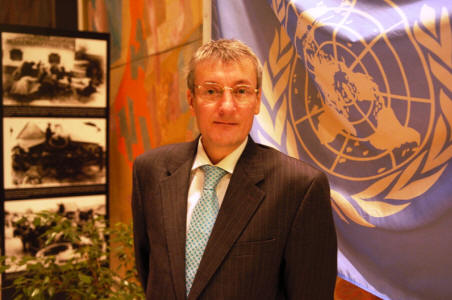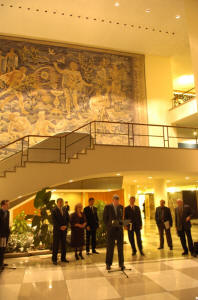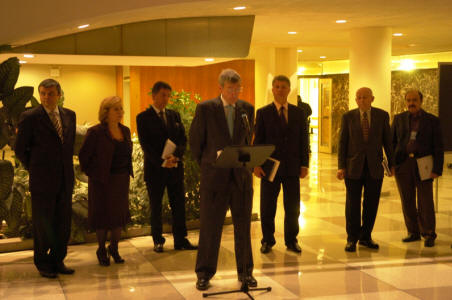Gareth Jones
[bas relief by Oleh Lesiuk]
HOME |
Stop Press |
Complete Soviet Articles & Background Information |
Précis of Gareth's
|
All Published Articles |
BOOKS
|
|
|
|
More Than Grain of Truth(2005) |
|
|
TOPICAL
'Are you Listening NYT?' U.N. Speech - Nov 2009 |
Gareth Recognised at Cambridge - Nov 2009 |
Reporter and the Genocide - Rome, March 2009 |
Order of Freedom Award -Nov 2008 |
Premiere of 'The Living' Documentary Kyiv - Nov 2008 |
Gareth Jones 'Famine' Diaries - Chicago 2008 |
Aberystwyth Memorial Plaque 2006 |
GENERAL
Scholarship Fund |
Site Map |
Links |
Legal Notices |
Sponsored Links |
Contact |
'Are You Listening, The New York Times?'
Nigel Colley's Speech at the Opening of a Holodomor Exhibition at the United Nations in New York on 23 November 2009.
Last week, 180 newspapers across the world, from the Washington Post to the London Times reported the remarkable story of Gareth Jones and his graphic eyewitness accounts of his off-limits trek into Ukraine during the height of Moscow’s starvation of that country. Today, we call it the "Holodomor." Gareth’s accounts are preserved in his journalist’s diaries which probably now represent the only surviving contemporary independent western verification of that genocide. These precious diaries are currently on display in the Wren Library at Cambridge University, where Gareth had been a student. They sit side by side with memorabilia of other illustrious alumni including Sir Isaac Newton’s personal annotated copy of ‘The Principia’, in which he proposed his fundamental mathematical Laws of Motion.
When I came to the UN in 2003 with my mother to attend the first exhibition commemorating the 70th anniversary of the Holodomor, few had heard of the great man-made famine in Ukraine and even fewer knew of Gareth’s role in telling the world about it. Gareth Jones was born in Barry, South Wales in 1905, the son of a School headmaster. After graduating from Cambridge in 1929 with a first-class honours’ degree in Russian, German and French, he was employed by David Lloyd George, the former British WW1 Prime Minister as his foreign affairs advisor.
In 1930 he went to the Soviet Union on behalf of Lloyd George. Following an unescorted pilgrimage to the Ukrainian city of Donetz, where his mother had been a governess in the 1890s, he returned disillusioned at the brutality of the Stalinist regime against the Ukrainian people and was invited to write three articles about the subject for the London Times.
In London, in the September of 1932, Gareth learnt through several informed sources, of reports emanating from Moscow, of a severe famine in the southern part of the Soviet Union. Professor Jules Menken (of the London School of Economics), an eminent economist of the time, told Gareth that he "dreaded this winter, when he thought millions would die of hunger and finally stated that "There was already famine in Ukraine." Due to the censorship of the press in Moscow the world was unaware of the ongoing plight of the Ukrainians.
In light of this information, Gareth wrote two prophetic articles published in the Cardiff Western Mail in October 1932, entitled: "Will There be Soup?" where he painted a very bleak picture of the coming Soviet winter. However, he knew that in order to expose the famine in Ukraine he needed to see it first hand. Otherwise the Soviet sources would continue to deny its existence.
They are killing us." "People are dying of hunger."
He arrived in Moscow on the fifth of March 1933, and privately interviewed diplomats and journalists. After five days Gareth quietly left by train for Ukraine with a rucksack full of loaves of white bread, butter, cheese, meat and chocolate, which he had bought at the foreign currency stores.
On his journey Gareth wrote of an episode; ‘Boy on train asking for bread. I dropped a small piece of bread on floor and put it in a spittoon. Peasant came and picked it up & ate it.’ Later he noted ‘Man speaking German, same story "Tell them in England, Starving, bellies extended. Hunger.’
Without official papers he had to leave the train at the Russian/Ukrainian border and sneak across. He stopped off in villages along the way talking to the inhabitants and sleeping on the bug-infested floors of their homes. In his diaries he wrote… ‘Everywhere I talked to peasants who walked past – they all had the same story; "There is no bread – we haven’t had bread for over 2 months – a lot are dying." The first village had no more potatoes left and the store of БҮРЯК (beetroot) was running out. They all said ‘the cattle are dying. (Nothing to feed.) НЕЧЕВО КОРМитьn.
Then I caught up with a bearded peasant who was walking along. His feet were covered with sacking. We started talking. He spoke in Ukrainian Russian. I gave him [a] lump of bread and of cheese. [He said:] "You could not buy that anywhere for 20 roubles. There just is no food". We walked along and talked [he told me]; "Before the war this was all gold. We had horses and cows and pigs and chickens. Now we are ruined. [We are] ПОГИБЛИ (the living dead). "Before the war we could have boots and meat and butter. We were the richest country in the world for grain. We fed the world. Now they have taken all away from us. "Now people steal much more. Four days ago, they stole my horse. "A horse is better than a tractor. A tractor goes and stops, but a horse goes all the time. A tractor cannot give manure, but a horse can.
He took me along to his cottage. His daughter and three little children [were there]. Two of the smaller children were swollen. "If you had come before the Revolution we would have given you chicken and eggs and milk and fine bread. Now we have no bread in the house. They are killing us." "People are dying of hunger."
There was in the hut, a spindle and the daughter showed me how to make thread. The peasant showed me his shirt, which was home-made and some fine sacking which had been home-made. [He explained] "But the Bolsheviks are crushing that. They won’t take it. They want the factory to make everything." The peasant then ate some very thin soup with a scrap of potato. No bread in house. The white bread [of Gareth’s] they thought was wonderful.
In Kharkiv, he noted in his diary; ‘Queues for bread. Erika [from the German Consulate] and I walked along about a hundred ragged pale people. Militiaman came out of shop whose windows had been battered in and were covered with wood and said: "There is no bread" and "there will be no bread today." Shouts from angry peasants also there. "But citizens, there is no bread." "How long here?" I asked a man. "Two days." They would not go away but remained. [because] sometimes the cart came with bread. Waiting with forlorn hope.
Walter Duranty's intentional & wilfully misleading of the American public.
On 29th March 1933 Gareth exposed the Holodomor at a press conference in Berlin. However, within 24 hours he was personally denigrated by the then world’s highest paid correspondent and Pulitzer prize winner Walter Duranty in an article in the New York Times called ‘Russians hungry but not starving’. We know that this was intentional & wilfully misleading of the American public. The US Embassy in Berlin reported to the US State Department that in discussions with Duranty, he admitted that the NYT had entered into an agreement with Moscow to publish only the official Moscow party line.
Duranty made his outrageous and prompt rebuttal to Gareth’s press release stating:
"Since I talked with Mr. Jones I have made exhaustive inquiries about this alleged famine situation. . . . There is serious food shortage throughout the country with occasional cases of well-managed state or collective farms. The big cities and the army are adequately supplied with food. There is no actual starvation or death from starvation, but there is widespread mortality from diseases due to malnutrition . . ."
Duranty went on to explain the Soviet determination for the 5-year plan to succeed; "But - to put it brutally - you can’t make an omelette without breaking eggs."
Gareth had embarrassed both the Americans and the Soviets who were engaged in delicate negotiations towards establishing diplomatic recognition between the two countries. His reward was to be banished from the international journalistic scene from more than a year. On the opposite end, Duranty wrote that Maxim Litvinov, the Soviet Commissar of Foreign Affairs, was going home to Moscow with a "pretty fat turkey for Thanksgiving."
On November 16, 1933, some eight months after Gareth’s revelations, Litvinov, whom Gareth had privately interviewed in March 1933, managed to secure American diplomatic recognition of the USSR. He also banned Gareth from returning to the Soviet Union.
Black-Listed & Accused of Espionage by the Soviets
From a letter written to a friend in 1934, Gareth wrote
"Alas! You will be very amused to hear that the inoffensive little 'Joneski' has achieved the dignity of being a marked man on the black list of the O.G.P.U. and is barred from entering the Soviet Union. I hear that there is a long list of crimes which I have committed under my name in the secret police file in Moscow and, funnily enough, espionage is said to be among them. As a matter of fact Litvinoff sent a special cable from Moscow, to the Soviet Embassy in London, to tell them to make the strongest of complaints to Mr. Lloyd George about me."
Gareth was tragically murdered little more than two years later in 1935, supposedly at the hands of Chinese bandit kidnappers in Inner Mongolia, though there is much circumstantial evidence to link his murder with the Soviet Secret Police. The trading company he was travelling with was Wostwag, a trading front for the NKVD. Thus one of the very few western witnesses of the Holodomor was effectively silenced. Gareth’s story would have ended there if it weren’t for serendipity or maybe fate. Except perhaps for oblique references to Jones in a couple of George Orwell’s writings, then for almost 70 years his memory and role in exposing the Holodomor were forgotten, not just by the world but also by the Ukrainian Diaspora.
Thanks to the interest generated in 2003, much of the world has been made aware of the true circumstances of the Holodomor but it saddens me to report that although the world press ran the story last week, including a whole page in the London Times, conspicuous by its absence was the NYT.
All the NYT Pulitzer prize winners are being besmirched by the infamous acts of one rogue journalist. Isn’t it time Mr Sulzberger that as publisher of the NYT you should do the decent thing and return his Pulitzer? You owe it to your own paper’s reputation, and your readership, to live by your famous motto and publish ‘all the news that’s fit to print’.
Truth, and an informed public, are the linchpin of a free society.
What does all this mean, today? Well, let me first take you back even further to the past. One hundred and seventy years ago, a Frenchman, Marquis de Custine published a book detailing his travels in Russia. Among the observations was this: "Russian despotism not only pays little respect to ideas and sentiments, it will also deny facts; it will struggle against evidence, and triumph in the struggle!"
Truth, and an informed public, are the linchpin of a free society. The campaign in Russia to resurrect Stalin, to whitewash his inhuman crimes, is well under way. There are disturbing signs that his rehabilitation will not only be poorly opposed but may even be facilitated by certain media around the world. Gareth Jones is a shining example of honest journalism, a benchmark to be aspired to by today’s media. It is thanks to efforts of many around us that the Holodomor is slowly, but surely, being accepted as the apogee of Stalin’s terror. I believe that Gareth was viciously murdered by the Soviet secret police. It was what the Frenchman Custine warned about, the Russian struggle against evidence. Just as decades later journalists and others who sought to uncover Moscow’s crimes before a trusting world, would also be murdered. No one is asking you to risk your lives. But do risk a little of your time and energy to uphold principle, honour and the truth. To make sure that despotism does not triumph.
Thank you very much.
[CLICK HERE for the related Cambridge University exhibit of Gareth's 'Famine' Diaries at the Wren Library.]






